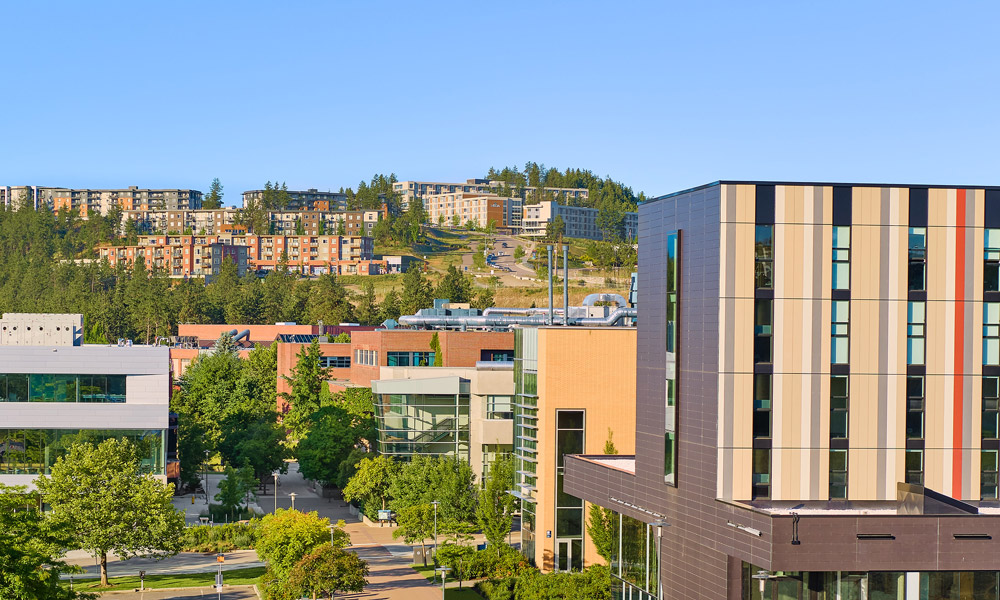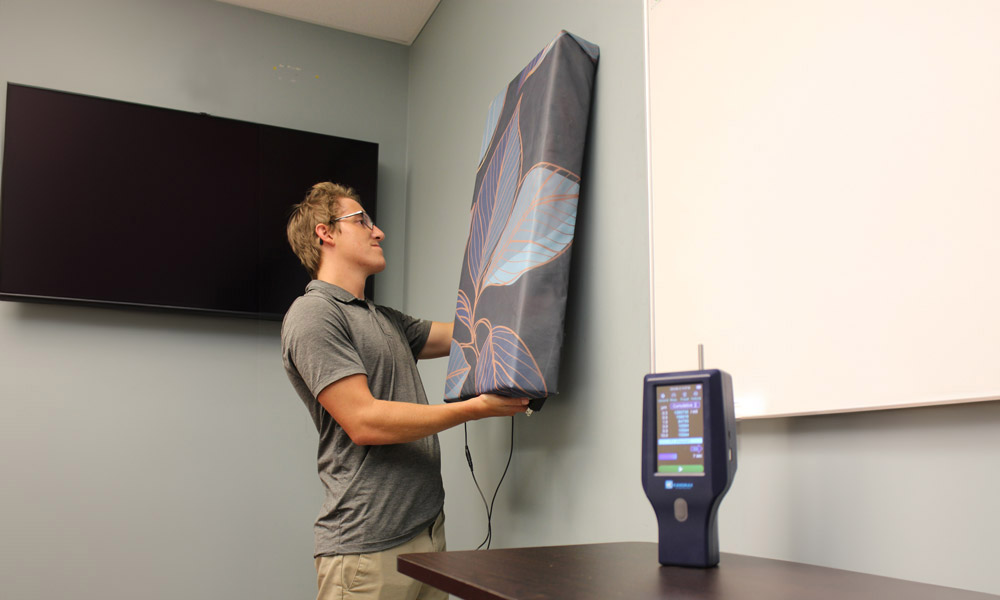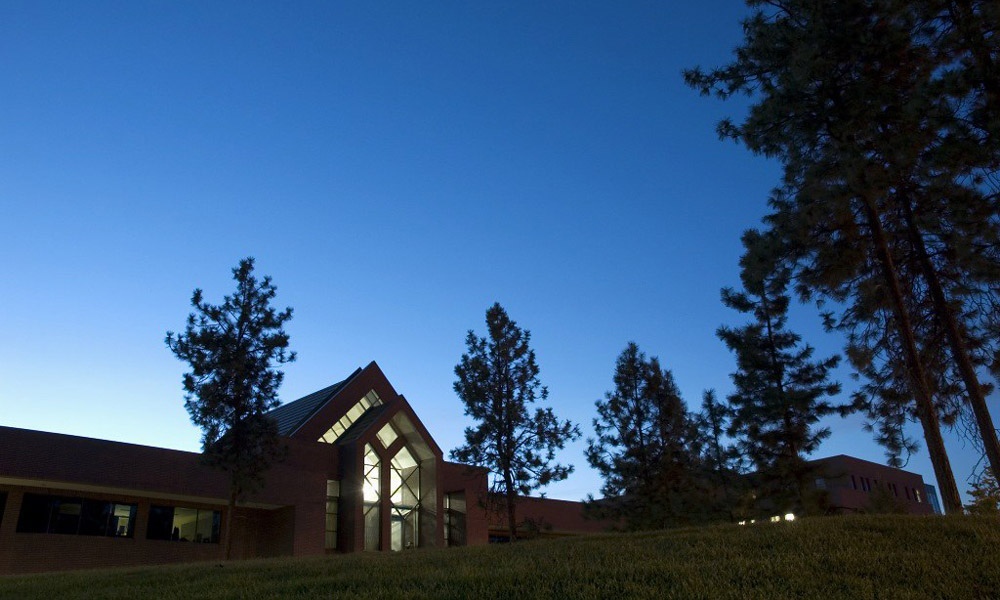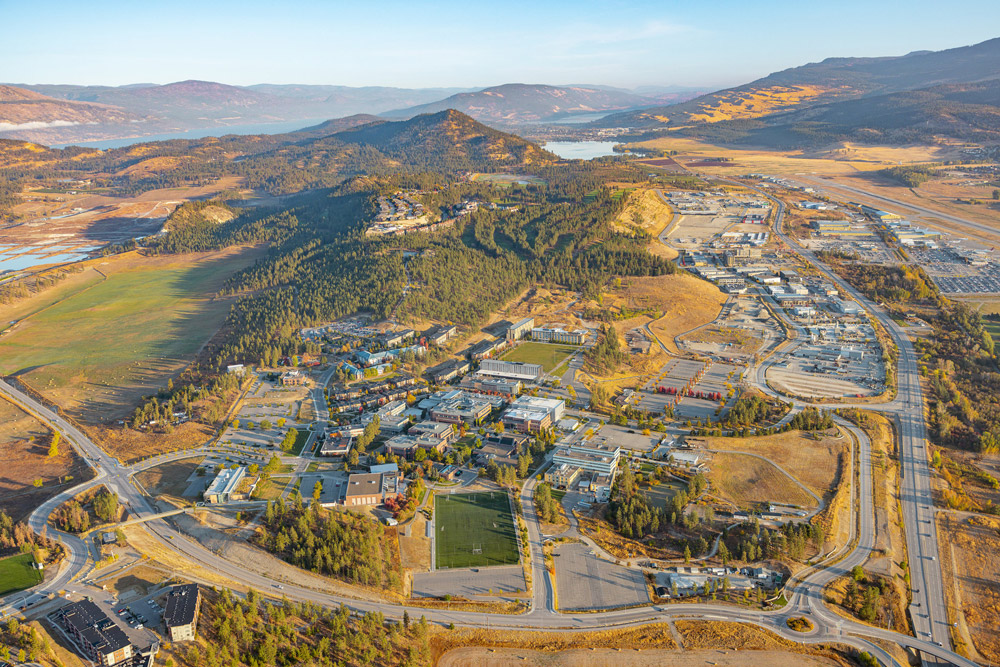Projects funded to improve campus air quality, energy efficiency and wildfire resiliency

New research projects from the Campus as a Living Lab program will help UBC Okanagan set an example of sustainability in the region.
Now in its second year, the Campus as a Living Lab (CLL) program is funded by the Office of the Vice-Principal, Research and Innovation and partners researchers with campus operations staff to help design and implement innovative solutions to on-campus challenges. This opportunity allows research to be directly applied to a real-world setting while providing meaningful impact to the campus through climate action, resilient systems, sustainable places and communities, or health and wellbeing.
This year’s results saw two successful projects selected in a competitive process.

Ryan Gordon, a summer research assistant, hangs an ART device in the Pritchard Simulation Centre at Kelowna General Hospital. These low-cost air filtering devices will be mounted in high-priority areas across UBC Okanagan to reduce viral spread and air pollution.
IMPROVING INDOOR AIR QUALITY
Dr. Sunny Li (School of Engineering) and Dr. Jonathan Little (Faculty of Health and Social Development) are partnering with Roger Bizzotto and Martin Gibb in Facilities Management to clean UBC Okanagan’s air through wall-mount air filtering devices that are cleverly disguised as paintings.
Developed out of the work of the Airborne Disease Transmission cluster, these Aerosol Removing Tapestry (ART) devices use positively charged filters to reduce airborne particles and bacteria. The ART device is low cost, quiet and uses only about four watts of energy per device. The team plans to assess UBC Okanagan indoor spaces for the highest risk areas of viral spread and pollutant inhalation, test different device sizes and locations, and monitor their effects on airflow in this live setting.
“This work has significant potential for the health and wellbeing of students, as the Okanagan region is grappling with a rise in respiratory illness and increased wildfire smoke in the summer months,” says Dr. Li. “Being a successful applicant for the Campus as a Living Lab competition is a great honour. We are thrilled to embark on this collaborative journey exploring how we might enhance the indoor air quality across our campus through the implementation of our ART filter devices.”

Researchers and campus staff are aiming to improve the efficiency of the energy system responsible for the campus’s legacy academic buildings, including the Campus Administration building pictured above. Photo credit: Martin Dee / UBC Communications & Marketing
IMPROVING CAMPUS ENERGY EFFICIENCY
The second project will apply Dr. Klaske van Heusden’s control-relevant modeling research from the School of Engineering to optimize UBC Okanagan campus heating and cooling systems for increased energy efficiency and reduced greenhouse gas emissions.
Control-relevant models are simple, approximate models estimated from data. Designed to minimize the impact of modeling errors, they’re created to help enable high-performance control systems that are relatively easy to maintain.
In 2019, 88 per cent of the greenhouse gas emissions from UBCO campus operations were due to heating buildings with natural gas. Working with Colin Richardson, Associate Director of the UBC Okanagan Energy Team, Dr. van Heusden will apply her modeling research to help improve the energy system responsible for the older academic buildings on campus. This system currently functions about 68 per cent efficiency, despite the potential for operating at 90 per cent.
The team believes the project will mark the first time this type of modeling has ever been applied to energy control systems in buildings. The modeling approach is more cost effective than other more complex modeling options and can lead to simpler solutions that don’t require specialized staff to control and implement.
“It is well known that most buildings function well below the energy efficiency they were designed for,” says Dr. van Heusden. “The technology to optimize energy use is mature and reliable but is not used in practice. We’re working on methods that can bridge this gap. I’m very excited to evaluate the impact of our technology on greenhouse gas emissions, right here at UBCO.”
The Campus as a Living Lab project launched at UBC Okanagan in 2022 and funded their first cohort in 2023.
“I’m thrilled to see projects that are going to directly benefit the campus community,” says Dr. Miranda Hart, Campus as a Living Lab project lead.
“Air quality is a growing concern for the campus, and the world in general. The technology developed through CLL is an elegant, easy solution that may eventually help improve life quality for millions. Optimizing our campus energy system will reduce campus carbon footprint, help us on our goal towards carbon neutrality and reduce our contribution to climate change.”

Located in the wildfire-prone Okanagan Valley, UBC Okanagan can greatly benefit from a smart fire detection system throughout its network of buildings. Photo credit: Geoff Lister
GRAND CHALLENGE – WILDFIRE RESILIENCY
In addition to the annual CLL competition, this year introduced the Campus as a Living Lab Grand Challenge, a one-time opportunity for two UBC Vancouver projects, and one at UBC Okanagan, to be awarded major seed funding to address on-campus solutions to the climate emergency.
The successful Okanagan project—proposed by Dr. Qian Chen and Dr. Shahria Alam from the School of Engineering and Roger Bizzotto of Facilities Management—will implement a smart fire detection system to improve wildfire resilience at UBC Okanagan. Keeping in mind the 2023 wildfire and the high overall fire risk in the Okanagan, the team will build a 360-degree system of “virtual watchtowers” that use sensor networks, thermal camera imaging and AI-driven predictive control.
“With this system, each building on campus becomes a smart agent to understand when to trigger sprinkler system, and when and how to optimize air purification in hot spots in response to real-time particulate matter data, reducing considerable manual effort from the facilities management team to patrol and manage those systems,” says Dr. Chen.